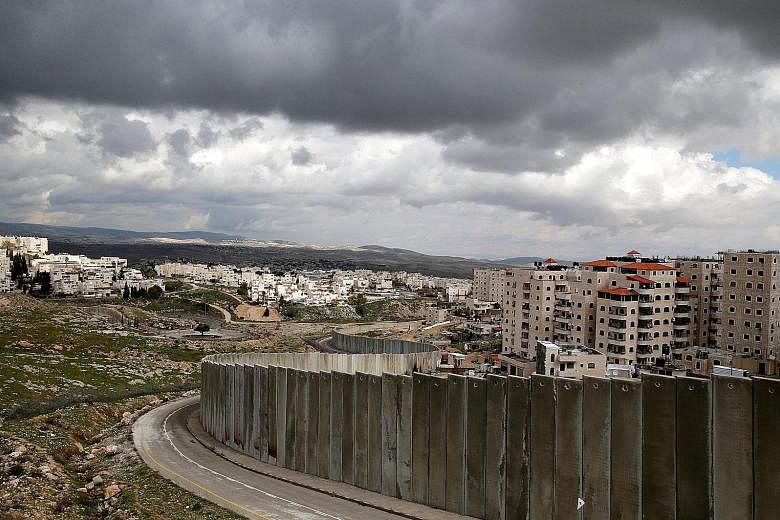JERUSALEM • An emboldened Israeli right wing is moving quickly in the new year to make it far harder to create a Palestinian state, signalling its aim to doom hopes for a two-state solution to the conflict.
The actions have come on multiple fronts, as Likud, Prime Minister Benjamin Netanyahu's party, for the first time has urged the annexation of Jewish settlements in the West Bank, and the nation's top legal officers pressed to extend Israeli law into occupied territory.
Israel's Parliament voted yesterday to enact stiff new obstacles to any potential land-for-peace deal involving Jerusalem, while easing the way to rid the city of several overwhelmingly Palestinian areas, according to Israeli media reports.
Coming on the heels of President Donald Trump's recognition of Jerusalem as Israel's capital in defiance of decades-old US policy and international consensus, the moves show the Israeli right senses a new opening to pursue its goal of a single state from the Jordan River to the Mediterranean.
"We are telling the world that it doesn't matter what the nations of the world say," Public Security Minister Gilad Erdan told Likud's central committee on Sunday.
"The time has come to express our biblical right to the land."
Palestinians and Israeli supporters of a two-state solution said the moves reveal the true colours of the country's ascendant right wing.
"We hope this vote serves as a reminder for the international community that the Israeli government, with the full support of the US administration, is not interested in a just and lasting peace," said Mr Mahmoud Abbas, President of the Palestinian Authority, on Monday.
"Rather its main goal is the consolidation of an apartheid regime in all of historic Palestine."
Mr Daniel Seidemann, director of Terrestrial Jerusalem, which focuses on the city's fate in a potential two-state solution, said: "What was winked and nodded about before is now being acknowledged publicly: 'We have no intent of sharing this land with anybody else except as a barely tolerated minority'."
Arguably the most provocative action was a non-binding but unanimous vote by Likud's central committee to support the "free construction and application of Israeli law and sovereignty in all liberated areas of settlement" in the West Bank. If such a measure became law, it would effectively annex Israeli settlements on land that the Palestinians demand for a future state and leave them with an archipelago of disconnected territory.
The West Bank is under military jurisdiction, though settlers are subject to civilian law.
Even as Likud met, Israel's Attorney-General Avichai Mandelblit published on Sunday a new formal instruction to all government offices, as part of an agreement with the Justice Ministry, that any new legislation explicitly state how it should be applied on the West Bank, or else the responsible government agency must say why it should not apply there.
Justice Minister Ayelet Shaked played down the instruction, telling Kan Radio it would speed the application of Israeli law to areas where settlers live, which now sometimes takes years, she said, because it must first be adopted by the military commander, who lays down the laws of the occupation.
But opponents of the occupation said the little-noticed bureaucratic move had great significance. "The Knesset cannot pass laws that are valid in Japan," said Ms Hagit Ofran, an advocate at Peace Now, a leftist group that opposes settlements, referring to the Israeli Parliament.
"You can only legislate in places that you have jurisdiction. And if they claim jurisdiction over occupied territories, it means they're annexed."
NYTIMES

